Results
-
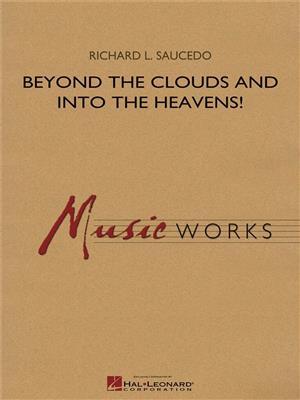 £79.99
£79.99Beyond the Clouds and Into the Heavens! - Richard L. Saucedo
Richard takes the listener and performer on an extended journey through various mood styles in this impressive work for mature ensembles. The stately opening strains gather momentum and intensity, leading to a fast-paced sectionthat features intertwining solo and small group fragments passed throughout the texture. An overall soaring theme adds a tone of triumph and grandeur throughout, and the final push to the end is both exhilarating and rhythmicallydynamic. Dur: 6:50
Estimated dispatch 7-14 working days
-
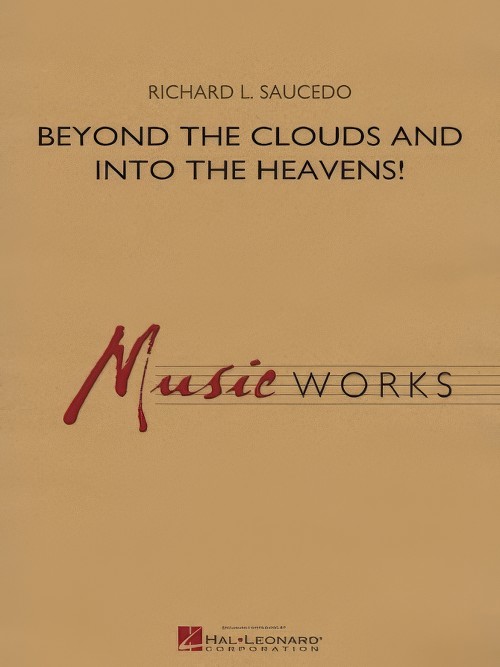 £79.99
£79.99Beyond the Clouds and Into the Heavens! (Concert Band - Score and Parts) - Saucedo, Richard L.
Richard takes the listener and performer on an extended journey through various mood styles in this impressive work for mature ensembles. The stately opening strains gather momentum and intensity, leading to a fast-paced section that features intertwining solo and small group fragments passed throughout the texture. An overall soaring theme adds a tone of triumph and grandeur throughout, and the final push to the end is both exhilarating and rhythmically dynamic.Duration: 7.00
Estimated dispatch 7-14 working days
-
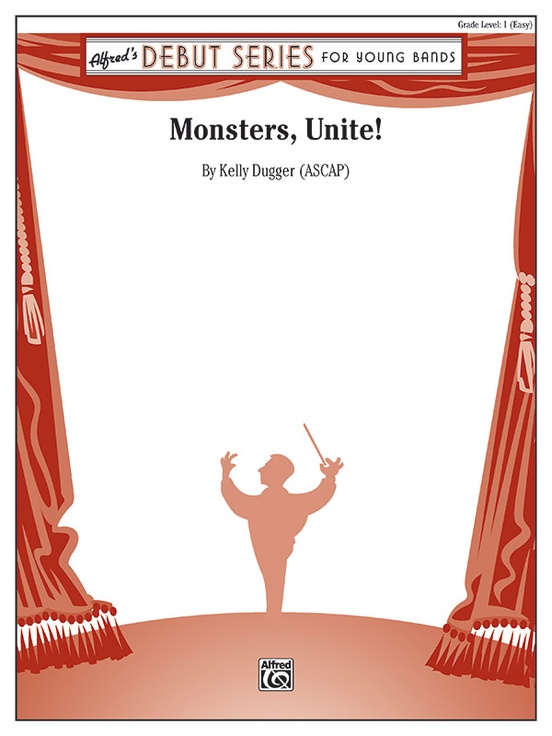 £52.95
£52.95Monsters, Unite! (Concert Band - Score and Parts) - Dugger, Kelly
Monsters, Unite! by Kelly Dugger is a fun beginning band piece that is sure to be a hit, not only at Halloween time but all year round. Monsters all around the world are waking up to a calling to unite. Some are big, hairy creatures, and others are delicate and fairy-like. They walk and fly long distances to find each other. In the end, they all come together, marching as one. Just when you think they've marched off into the distance, they come together to surprise the audience. Unique percussion effects, timpani glissando and theremin (or flexatone) add to the spooky sound. A tuba solo at the end is followed by a surprising scream that will leave the performers and the audience giggling! Duration: 1.30
Estimated dispatch 7-14 working days
-
 £104.99
£104.99Prelude and Polonaise - Nikolai Rimsky-Korsakov
Nikolai Rimsky-Korsakov (1844-1908) composed his opera The Night before Christmas in 1894-95. The premiere took place on December 10 1895 in St. Petersburg. The libretto to the opera came from Rimsky-Korsakov himself and is based on a tale by Nikolai Gogol, which some years earlier had already served as operatic material for Pjotr Tchaikovsky. The opera tells the story of Vakula, the blacksmith of a small Ukranian village. He is madly in love with Oxana who demands - as proof of his love - a most unusual Christmas present: the magnificent slippers of the Empress. Knowing full well that, in normal circumstances, he would never be able to fulfil Oxana's wish, Vakula seekssupernatural assistance and finds it in the shape of the devil, who comes up with a ploy to help him. The devil carries him on his back to St. Petersburg, where during a lavish reception at court Vakula finds an opportunity to present his request to the empress. The Empress actually agrees to Vakula's wish and hands over her slippers to him. Thereupon he returns to his own village. Here, in the meantime, he had been given up for dead, and Oxana had been plunged into great sorrow as she had come to realise that she also truly loved Vakula. In the end, however, all misunderstandings are resolved and all adversities overcome: Oxana receives her extravagant present, the lovers are united, and the church bells call the villagers to the Christmas service.The vibrant Polonaise is played in the 3rd act of the opera at the entrance of the Empress, whose appearance is anticipated in the prelude by the fanfare motives. The music paints a vivid picture of the party atmosphere and the marvellous dcor at the imperial court of St. Petersburg, which Rimsky-Korsakov conjures up in his opera and which can also be played outside of the Advent and Christmas season, for example as an opening piece to any festive concert.
Estimated dispatch 7-14 working days
-
 £174.99
£174.99Et in terra Pax - Jan Van der Roost
This piece was commissioned by the 'Concert Band Vlamertinge' and is a plea for peace: the title translates as 'Peace on Earth'. This is expressed by means of the vocal contribution expected from the performers. In various places of the piece you can recognize, the words 'Et In Terra Pax' - an appeal for peace - at first jumbled together but later more rhythmically structured, developing into synchronized massed voices.The work starts with a pentatonic theme based on the notes D, E, G, A and C (taken from 'ConCErtbAnD VlAmErtinGE' and the name of the conductor, NiCk VAnDEnDriessChe). A somewhat sad melody is developed during an orchestral climax which leads to the firstexplosion of sound (measure 62 onwards). Suddenly the opening measures are recaptured, albeit with a differently colored sound: the words 'Et In Terra Pax' bring the first movement to a close. A restless Allegro follows which abruptly stops and is replaced by a calming cho-rale-like passage. A narrator reads aloud the poem 'Sonnet' by the young poet Charles Hamilton Sorley, who was killed during World War I. This poem fittingly puts into words the cruelty and senselessness of war. After the expanded recapitulation of the allegro, the broad, almost infinite atmosphere of the beginning returns. Clarinet and English horn play the pentatonic opening theme once more, this time broadly, while the words 'Et In Terra... Pax' are repeated again and again by the rest of the orchestra.The composer has purposely avoided all forms of aggression and bombastic sounds regularly used in works about war. Fear of violence and destruction can be heard and felt during the allegro passages. The charged opening makes way in the end for hope: May peacefulness replace cruelty in everyday life, too.
Estimated dispatch 7-14 working days
-
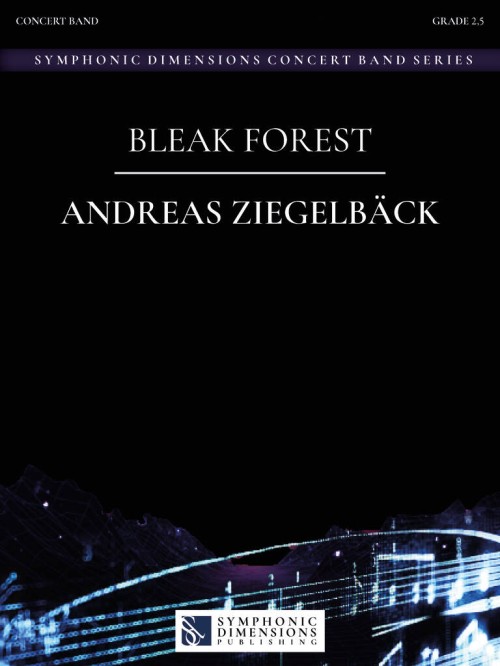 £78.50
£78.50Bleak Forest (Concert Band - Score and Parts) - Ziegelback, Andreas
Bleak Forest is a piece for smaller concert bands and offers the musicians above all space to improve their sound and their effect playing. The technical requirements are therefore deliberately kept low. With this piece, the composer won the VLAMO International Composition Contest 2022.Thematically, the work is influenced by the composer's childhood memories. In his hometown there was a dark and mysterious forest, that seemed to the children in the small village to be magical. Without a reasonable explanation, every trip into the woods was exciting and somewhat terrifying. There were tales of dangerous animals, which can be heard at the beginning of the piece, as well as magical beasts. The magic of the forest is depicted musically from bar 70 in the andante section. The snapping of the fingers represents single raindrops. From bar 99 onwards, we hear the trek home, with the occasional moments of trepidation as the children spook each other with their fanciful tales. In the end, though, we arrive safely at home because after all, magical beasts only exist in fairy tales... don't they?Andreas Ziegelback studied music education at the Mozarteum University in Salzburg, and history at the Paris Lodron Universitat, Salzburg. In addition to his studies, he trained in ensemble conducting for wind orchestra with conductor and composer Thomas Doss. It was Doss who sparked Ziegelback's interest in composing. In 2021, Andreas Ziegelback completed his composition studies with Johannes Maria Staud. In 2020, he took part in a brass band composition masterclass in Bern with Oliver Waespi, followed by a premiere by the Swiss Army Brass Band.Duration: 6.00
Estimated dispatch 7-14 working days
-
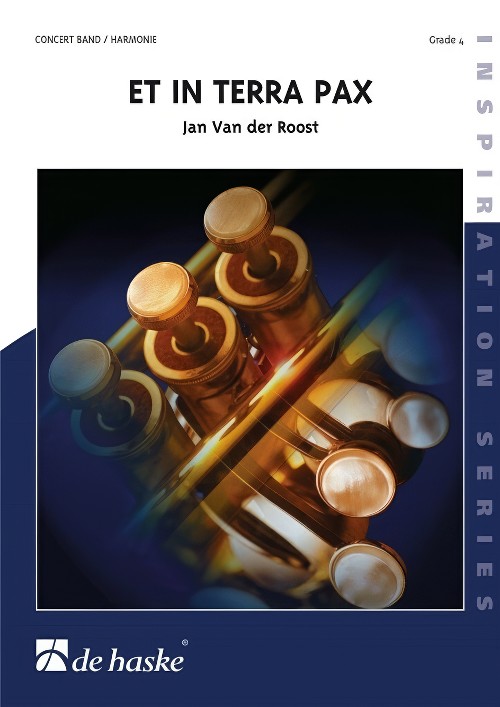 £174.99
£174.99Et in terra Pax (Concert Band - Score and Parts) - Van der Roost, Jan
This piece was commissioned by the Concert Band Vlamertinge and is a plea for peace: the title translates as Peace on Earth. This is expressed by means of the vocal contribution expected from the performers. In various places of the piece you can recognize, the words Et In Terra Pax, an appeal for peace, at first jumbled together but later more rhythmically structured, developing into synchronized massed voices. The work starts with a pentatonic theme based on the notes D, E, G, A and C (taken from 'ConCErtbAnD VlAmErtinGE' and the name of the conductor, NiCk VAnDEnDriessChe). A somewhat sad melody is developed during an orchestral climax which leads to the first explosion of sound (measure 62 onwards). Suddenly the opening measures are recaptured, albeit with a differently coloured sound: the words Et in Terra Pax bring the first movement to a close. A restless Allegro follows which abruptly stops and is replaced by a calming chorale-like passage. A narrator reads aloud the poem 'Sonnet' by the young poet Charles Hamilton Sorley, who was killed during World War I. This poem fittingly puts into words the cruelty and senselessness of war. After the expanded recapitulation of the allegro, the broad, almost infinite atmosphere of the beginning returns. Clarinet and English horn play the pentatonic opening theme once more, this time broadly, while the words Et in Terra Pax are repeated again and again by the rest of the ensemble. The composer has purposely avoided all forms of aggression and bombastic sounds regularly used in works about war. Fear of violence and destruction can be heard and felt during the allegro passages. The charged opening makes way in the end for hope: May peacefulness replace cruelty in everyday life, too.Duration: 13:45
Estimated dispatch 7-14 working days
-
 £118.99
£118.99Songs from the Catskills - Johan de Meij
The Catskill Mountains is a beautifully preserved region in Upstate New York, flanked to the east by the Hudson River. From the moment my Johan de Meij and his wife settled in 2008 in Saugerties, a quaint Hudson Valley town 100 miles north of Manhattan, he started immersing himself into the area's rich musical history. Discovering a fascinating mix of American, Irish and Scottish folk music, ultimately, it was not easy to choose from such abundance. In the end Johan de Meij ended up using the following songs The Foggy Dew, Last Winter was a Hard One, A Poor and Foreign Stranger, The Bluestone Quarries, and
Estimated dispatch 7-14 working days
-
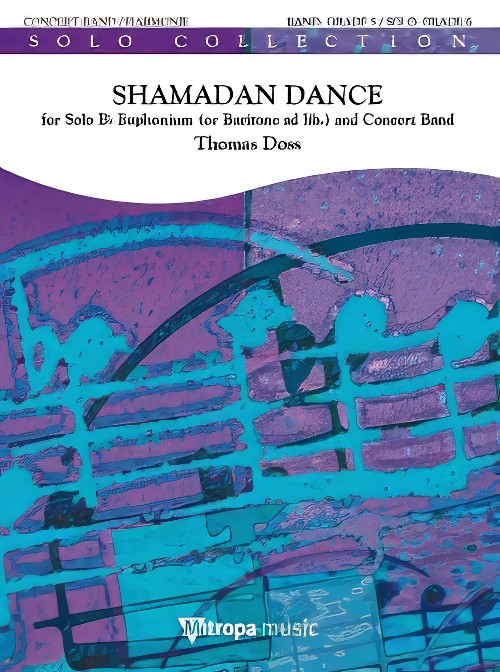 £124.99
£124.99Shamadan Dance (Euphonium Solo with Concert Band - Score and Parts) - Doss, Thomas
The Shamadan is an old oriental folk dance full of symbolism in which a female dancer, often on the occasion of a wedding, balances a candelabra on her head as a token of spiritual light. In this work, the euphonium takes up the role of the dancer. At the very beginning, the soloist already has the opportunity to shine in an unaccompanied recitative. Next, the soloist and band alternate, and in the course of the work the band also plays an important part with various technical highlights. More variation is created with a solo passage accompanied by percussion and hand claps, culminating beautifully in a grand tutti towards the end of the piece. Challenging music with much to enjoy! Duration: 8.30
Estimated dispatch 7-14 working days
-
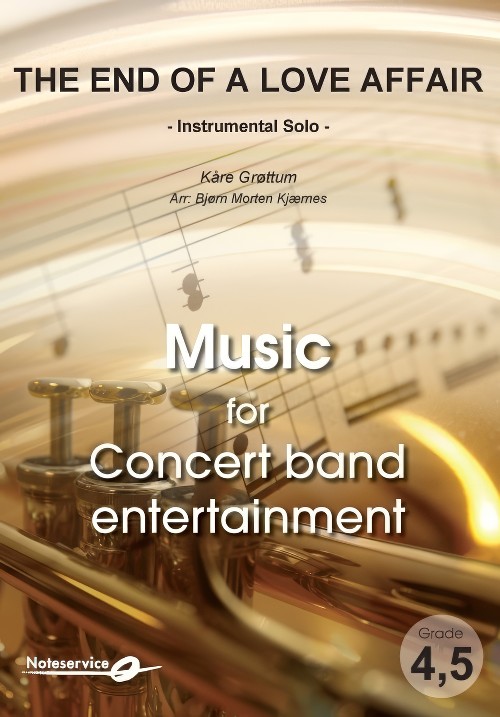 £91.00
£91.00The End of a Love Affair (Flexible Instrument Solo with Concert Band - Score and Parts) - Grottum, Kare - Kjaernes, Bjorn Morten
Kare Grottum is known to most as a pianist and producer by NRK. He was involved in numerous TV productions, both as producer, musician, composer, and arranger. This tune is taken from a CD released in 1992, Fra en musikers dagbok where he brings with him several Norwegian soloists of international class. It is Erling Wicklund who does a brilliant solo on Flugabone which has also used as a starting point for the written improvisation. The arrangement should be played in a slightly swinging way, but not as much as a jazz waltz. Play with the straight eighths and then let it flow, with a faint two against three feeling, which clearly shows up in some places. If you do not have bassoon and oboe, let alto sax and tenor sax make up the duet from 9. Enjoy! Solo Options: C BC Instruments; Bb TC Instruments; Eb TC Instruments. Duration: 4.15
Estimated dispatch 7-14 working days
